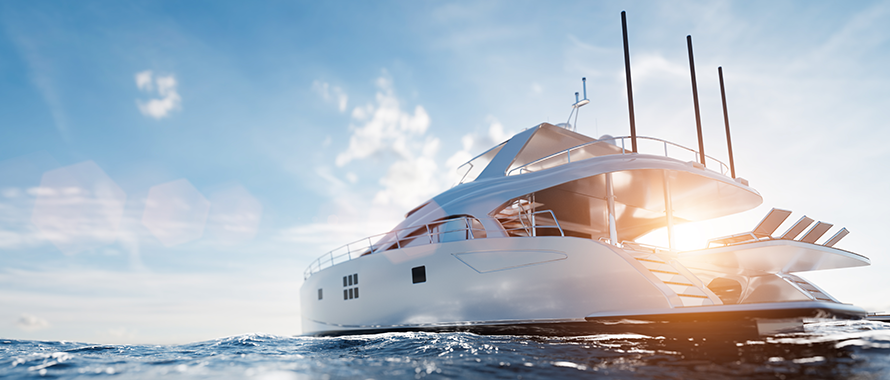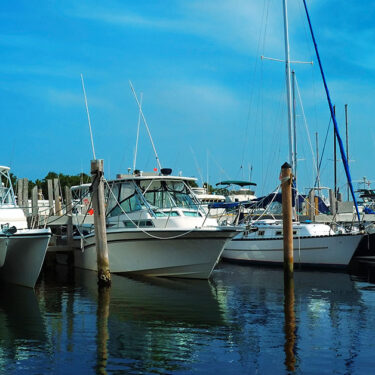The U.S. Coast Guard rescued four crew members after a 60-foot luxury yacht flooded and overturned off the North Carolina coast recently, forcing them to abandon ship in a life raft, according to reports. The captain of the vessel later sent his thanks to the Coast Guard and locals, who he said were “absolutely amazing” in the Oct. 21 helicopter rescue.
Featured Solutions
“It is definitely an extreme, almost worst-case scenario. Fortunately, no one was injured,” said Noah Wheeler, Broker, Marine, Burns & Wilcox, Ft. Lauderdale, Florida. “The ocean is super unpredictable, and it can be unforgiving. When you are out at sea, if something does go wrong, even something small, chances are it can be a really big problem.”

It is definitely an extreme, almost worst-case scenario. Fortunately, no one was injured. The ocean is super unpredictable, and it can be unforgiving.
The Moon Dragon, which featured six luxury cabins and natural teak hardwood floors, remained partially submerged as of Oct. 22. According to yacht charter company Ocean Getaways, charter prices for the yacht started at $58,000 per week, USA Today reported. The vessel is most likely a “total loss” under its Hull and Machinery Insurance, said Craig Anderson, Underwriter, Marine & Yacht, Burns & Wilcox, Ft. Lauderdale, Florida.
“When you are out to sea at that point, it is usually pretty much lost,” Anderson said. “It would likely be considered a total loss, and insurance could pay out the maximum of the hull value minus the deductible.”
‘Extremely high’ liability coverage often recommended for yachts
The Moon Dragon, which had been listed for sale in August for $2.49 million, was shown at the Annapolis Sailboat Show just days before the accident, Chesapeake Bay Magazine reported. While the cause of the yacht’s broken side hatches was not immediately clear, insurance companies generally require vessels to be evaluated every three years, Anderson said.
“The reports do not really state why or how it broke, but one key thing with any vessel is that the insurance companies do require a hull survey every three years to determine if it is seaworthy or not,” he said. “We do not know if it was surveyed recently, or it could have been an issue they did not know about and then became an issue out at sea before catastrophically going under.”
According to the U.S. Coast Guard’s Boating Safety Division, flooding and swamping incidents were the third most common type of boating accident in 2022, causing 422 accidents, 74 deaths, and 93 injuries. In Canada, capsizing accidents were the most common cause of recreational boating-related fatalities between 2008 and 2017, causing 394 deaths, according to Canada’s Drowning Prevention Research Centre.
In addition to a vessel’s Hull and Machinery Insurance, which is designed to cover physical damage to the boat itself, an essential component of Marine Insurance for yachts is Protection and Indemnity (P&I) Insurance. This policy provides liability coverage for third-party bodily injuries and property damage, including legal defense and settlements, and it is often recommended that charter yacht companies carry as much coverage as possible — from $1 million up to $10 million, or even higher with an Excess Liability Insurance policy.
“[Hull and Machinery Insurance] covers the physical damage of the vessel, and then the P&I Insurance is the liability associated with it,” Wheeler said. “When you are running a charter operation, it is really important to have plenty of liability coverage.”
At a minimum, P&I Insurance limits should be equal to or greater than the value of the vessel. “Our practice is that whatever the hull value is, we want to either meet or exceed that in the liability. If it was a $1.5 million vessel, we want to insure it for at least $2 million in liability so there is no gap,” Anderson explained, adding that often in more “litigious” states like Florida, “as soon as an attorney gets involved, everybody is listed in the lawsuit.”
Typically, with yachts, Wheeler added, “the liability limits are extremely high,” and greater liability limits may be needed when the charter includes overnight operations. “We recommend having a high limit for captain charters — often $5 million,” Wheeler said. “When individuals rent the vessel for multiple days at a time and stay on it overnight, that makes it a lot harder of a risk to insure and a lot less appetizing for underwriters.”
While charters without a captain, known as bareboat charters, are offered by some companies, “usually with a 60-foot vessel, it would require a captain because of the size,” Anderson noted.
Consider crew liability, personal property coverage
A yachting company in Florida is currently facing a lawsuit from the family of a 20-year-old who died after jumping off a yacht and getting caught in a rip tide, People Magazine reported in October. The lawsuit accuses the company of negligence, alleging that the crew did not warn the victim about the risk of jumping in. P&I Insurance is also important for other types of charter boat operations, including fishing charters. In May, four individuals died in a fishing charter accident involving a 30-foot Kingfisher Charters vessel, Alaska Public Media reported.
“Anytime you are going to have fare-paying passengers on board, it is recommended to go with a minimum of $1 million [in P&I Insurance],” Anderson said.
Crew member liability should also be considered, according to Anderson. “That would be a separate coverage,” he said. “That would usually need to be requested by the owner of the vessel.”
As with any insurance coverage, he added, “I would recommend that they go through the policy wording and especially take a look at the exclusions to find out what they are covered for and not covered for.”

Anytime you are going to have fare-paying passengers on board, it is recommended to go with a minimum of $1 million [in P&I Insurance].
The risk of hull damage due to severe weather, fire and other property risks must also be considered when purchasing Marine Insurance for a yacht. In December of 2019, singer Marc Anthony’s $7 million yacht caught fire in Miami, Florida, Business Insider reported at the time. No one was injured in the blaze, which caused an estimated $300,000 in cleaning costs alone.
A yacht owner’s Hull and Machinery Insurance is “very similar to Homeowners Insurance,” Anderson said. The attached components are generally covered as part of the structure, and the contents would be under a separate deductible, he said. “However, a lot of companies would have a separate deductible for the electronics — including the GPS and radio,” he said, noting that some owners may need additional enhancements on their Hull and Machinery Insurance, such as coverage for fishing supplies.
Importance of emergency plans, pre-purchase inspections
According to an August report by Fortune, the percentage of wealthy individuals who are purchasing yachts has been decreasing since 2017, despite growth in the number of “super-rich” individuals worldwide. The economic downturn and rising interest rates have also caused more boat owners overall to consider selling their vessels, according to Anderson.

You just want to make sure that in any event, you have no gaps in coverage at all. You can have the peace of mind that if something happens, the insurance company will have your back.
“I am seeing a lot of owners now are selling their boats because they cannot afford it, they simply just do not want to use it anymore, or they no longer see it as a viable option for them,” he said. “When there is an economic downtown, the toys are usually the first thing that get cut.”
Although it was previously more difficult to access insurance coverage for these vessels, that appears to be changing, Anderson pointed out. “Now the insurance market is actually opening up, offering some relief in the boating insurance industry,” he said.
Risk management will always be paramount for charter companies and individual boat owners, who are encouraged to be prepared with emergency procedures and provide safety briefings for all passengers, including information on life rafts, life preservers, following Coast Guard rules and more. “Education is always key,” Anderson said. “Passengers should have some sort of understanding that in the event something happens, these are the steps we are going to take.”

Insuring a massive yacht is not like insuring a Toyota Camry. Things can go wrong, and if it does go wrong, the next thing you know you may be on national news.
Pre-purchase inspections are always recommended, he added. “Anytime you purchase a vessel, get a pre-purchase survey and make sure that you know what you are buying,” he said. In addition, when it comes to purchasing Marine Insurance, “you just want to make sure that in any event, you have no gaps in coverage at all. You can have the peace of mind that if something happens, the insurance company will have your back,” he said.
Yacht owners should understand the importance of Marine Insurance and take time to read their policies in full. “Insuring a massive yacht is not like insuring a Toyota Camry,” Wheeler said. “Things can go wrong, and if it does go wrong, the next thing you know you may be on national news.”





